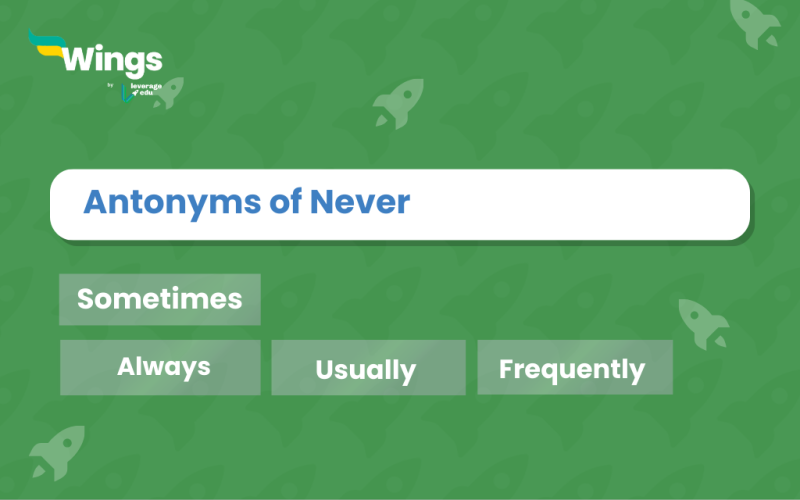The antonyms of “never” are words or phrases that indicate the presence or occurrence of something at some point in time. Some common antonyms are always, sometimes. occasionally, frequently etc.
Meaning of Never
“Never” is an adverb that indicates a total absence or the complete absence of something at any time or on any occasion. It is used to express the idea that an action, event, or condition has not occurred and is not expected to occur in the past, present, or future. Essentially, “never” signifies a perpetual or eternal absence of the specified action or event.
Antonyms of Abstinence, with Meaning and Examples
Antonyms of Never
Some common antonyms of never are listed below for your reference. Check them out!
- Always
- Frequently
- Occasionally
- Sometimes
- Usually
- Periodically
- Continuously
- Regularly
- Often
These words represent various degrees of frequency or regularity in contrast to the complete absence implied by “never.”
Unpleasant Antonyms, with Meaning and Examples
Usage with Examples
Here are some common antonyms of “never”:
- I’ll have a glass of These words represent various degrees of frequency or regularity in contrast to the complete absence implied by “never.” occasionally with dinner.
- The maintenance crew checks the equipment periodically.
- They frequently travel to exotic destinations for vacations.
- He sometimes eats dessert after dinner.
- She always arrives early for meetings.
Antonyms of Never
Choose the correct antonym of never from the below listed options:
- Otherwise
- Usually
- Always
Answer: Always & Usually
Antonyms of Consent, with Meaning and Examples
Related Posts
| Antonyms of Busy | Antonyms of Consonance |
| Synonyms of Importance | Synonyms of Brave |
| Adjectives Starting With The Letter I | Adjectives Starting With The Letter B |
| Idioms for Learning | Idioms for Experience |
This was all about the “antonyms of never” with meaning and examples. Hopefully, you understood the usage of the word. To read more antonym blogs, follow Leverage Edu
 One app for all your study abroad needs
One app for all your study abroad needs














 45,000+ students realised their study abroad dream with us. Take the first step today.
45,000+ students realised their study abroad dream with us. Take the first step today.

